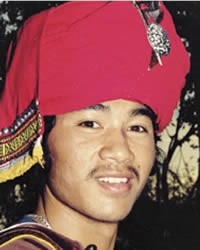Kawa in China

Photo Source:
Copyrighted © 2026
Operation China, Asia Harvest All rights reserved. Used with permission |
Send Joshua Project a map of this people group.
|
| People Name: | Kawa |
| Country: | China |
| 10/40 Window: | Yes |
| Population: | 92,000 |
| World Population: | 92,700 |
| Primary Language: | Wa, Vo |
| Primary Religion: | Ethnic Religions |
| Christian Adherents: | 0.20 % |
| Evangelicals: | 0.20 % |
| Scripture: | Complete Bible |
| Ministry Resources: | Yes |
| Jesus Film: | Yes |
| Audio Recordings: | Yes |
| People Cluster: | Mon-Khmer |
| Affinity Bloc: | Southeast Asian Peoples |
| Progress Level: |
|
Introduction / History
The Kawa, traditionally known as the Wild Wa, are one of three distinct language groups that were combined to form China's official Wa nationality. The Chinese divide the Wa into three sociolinguistic groups: the Kawa, or Wild Wa; the Lawa, or Tame Wa; and the Sinicized Wa.
The Kawa are the most reclusive group of Wa in China. Because of their isolated settlements, they rarely come into contact with outsiders and have retained their customs and traditions more than the Lawa or Parauk Wa. Until the 1960s the Kawa practiced head-hunting. Members of other nationalities dared not venture into Kawa territory for fear of being decapitated. Between 1948 and 1950, a Kawa cut off five Han merchants' heads because of a business dispute. He then sold the heads for ¥300 for the beardless ones and ¥2000 for those with a full beard. In 1946 the Kawa in Asai attacked the Wa in Gouhe, butchering 67 people and sparing only one life. "The booty of gory heads was carried back by eight cows." Villagers immediately took revenge for such attacks, causing a cycle of mutual killings that continued for years.
What Are Their Lives Like?
The Kawa do not generally like outsiders and prefer to be left alone. They grow a variety of crops, including rice, corn and maize.
What Are Their Beliefs?
The cruelty of the Kawa is unquestionably without equal among all the peoples of China. "Their infamous head-hunting, intended to beg for a good harvest, displayed their inhuman cruelty, for example, by buying a child Wa slave girl at the age of ten to be customarily killed by the procedure of a slow death." One writer summarized the spiritual condition of groups like the Kawa: "The ignorant minorities existed in constant fear: fear of demons, fear of the government officials, fear of landlords, fear of hostile tribes, and even fear of their own evil souls. The ghastly and bloodcurdling practices they developed to assuage their fears only resulted in further exacerbating them."
Although there are at least 75,000 Wa Christians in China, almost all of them are among the Parauk Wa and Lawa. Most Kawa stubbornly resist change and remain an unreached people group. Chinese historian T 'ien Ju-K 'ang explains, "Enthusiastic response for Christianity came only from the Tame Wa in Cangyuan district. In 1954, 78 churches, 73 local pastors, 108 Christian villages and 25,076 believers were reported.… In 1957, there were 97 villages in the Ximeng Mountains with 59,493 Kawa inhabitants, but no Christians were recorded."
What Are Their Needs?
Without the guidance of Christ, these people will be lost in this life and the life to come. They need someone to go to them as Christ-bearers.
Prayer Points
Pray for the spiritual blindness and bondage to the evil one to be removed so they can understand and respond to Christ.
Pray for the Lord to provide for their physical and spiritual needs as a testimony of his power and love.
Pray that the Kawa people will have a spiritual hunger that will open their hearts to the King of kings.
Pray for an unstoppable movement to Christ among them.